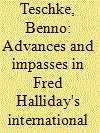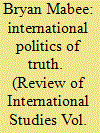| Srl | Item |
| 1 |
ID:
107559


|
|
|
|
|
| Publication |
2011.
|
| Summary/Abstract |
How did Fred Halliday recast International Relations (IR) theory as international historical sociology? This article explores Halliday's intellectual trajectory across this terrain and suggests that the notion of 'capitalist modernity', derived from an amalgamation of neo-Marxian and neo-Weberian historical sociology, functioned as the strategic master-category, which anchored his thought on International Relations throughout his work. This category was successively reconceived and complemented to generate four, partly contradictory, analytical frameworks at a lower level of abstraction: 'global conjunctural analysis'; a neo-Weberian 'sociology of the inter-state system'; 'international society as homogeneity' and 'uneven and combined development'. The article identifies the advances and impasses in each intellectual move and exemplifies the limits of Halliday's approach in relation to his analysis of revolutions. It suggests that while Halliday was instrumental in reconnecting IR with historical sociology, providing crucial openings and correctives to mainstream IR theory, his theoretical emphases remained ultimately too syncretistic and additive to shift the debate on firmer ground. While this can be read as a failure, there is also evidence to understand this anti-formalism as a deliberate intellectual choice. The article concludes by suggesting that the very term international historical sociology, predicated on a distinct modernist vocabulary, may itself preclude a full historicization of categories of analysis, restricting its use as a general framework for capturing the historicity and sociality of geopolitical practices across time and space.
|
|
|
|
|
|
|
|
|
|
|
|
|
|
|
|
| 2 |
ID:
187036


|
|
|
|
|
| Summary/Abstract |
C. Wright Mills's critical work on international relations is well known, but is often dismissed as being unscholarly, reductionist, and overly polemical. However, seeing the work in the context of his earlier career can allow for a new perspective, with Mills's activist views on war and militarism shaped very clearly by his earlier theoretical and political commitments. Mills developed a distinctive political sociological understanding of international politics, theorising the state as a historically-situated structural determinant of international power: a network of elite power that was contextualised by the influence of the socially constructed realities of the international created by elites. Mills's crucial critical contribution was to see the role of the intellectual as criticising these realities through the imaginative reconceptualisation of the world, which he called the ‘politics of truth’. The article argues the international politics of truth was not only Mills's distinctive theory of the international, but that it was clearly supported by his early theorisation of the international. A revised view of the importance of Mills's international relations work can help to situate Mills as part of a broader tradition of IR scholarship, a lost lineage of the critical historical and political sociology of the international.
|
|
|
|
|
|
|
|
|
|
|
|
|
|
|
|